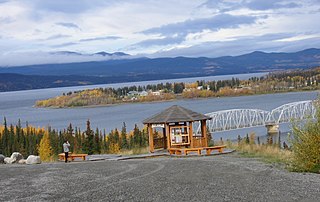Roddy Blackjack (c. 1927 – death announced on May 2, 2013) was a Canadian elder and former Chief of the Little Salmon/Carmacks First Nation of the Yukon Territory. He also served as an executive elder of the Council of Yukon First Nations and "elder in residence" at Yukon College. [1]

Canada is a country in the northern part of North America. Its ten provinces and three territories extend from the Atlantic to the Pacific and northward into the Arctic Ocean, covering 9.98 million square kilometres, making it the world's second-largest country by total area. Canada's southern border with the United States is the world's longest bi-national land border. Its capital is Ottawa, and its three largest metropolitan areas are Toronto, Montreal, and Vancouver. As a whole, Canada is sparsely populated, the majority of its land area being dominated by forest and tundra. Consequently, its population is highly urbanized, with over 80 percent of its inhabitants concentrated in large and medium-sized cities, many near the southern border. Canada's climate varies widely across its vast area, ranging from arctic weather in the north, to hot summers in the southern regions, with four distinct seasons.
The term Elder, or its equivalent in another language, is used in several different countries and organizations to indicate a position of authority. This usage is usually derived from the notion that the oldest members of any given group are the wisest, and are thus the most qualified to rule, provide counsel or serve the said group in some other capacity.
The Little Salmon/Carmacks First Nation is a First Nation in the central Yukon Territory in Canada. Its original population centre was Little Salmon, Yukon, but most of its citizens live in Carmacks, Yukon. The language originally spoken by the Little Salmon/Carmacks First Nation people was Northern Tutchone. They call themselves Tagé Cho Hudän.
Blackjack is considered an early architect of the Yukon Land Claims agreement. [1] In 1973, Blackjack traveled to Ottawa as part of a delegation of Yukon First Nation leaders. [1] He presented Canadian Prime Minister Pierre Trudeau with documents and other paperwork which would form the basis for the eventual Yukon Land Claims agreement. [1]
The Yukon Land Claims refer to the process of negotiating and settling aboriginal land claims agreements in Yukon, Canada between First Nations and the federal government. Based on historic occupancy and use, the First Nations claim basic rights to all the lands.

Ottawa is the capital city of Canada. It stands on the south bank of the Ottawa River in the eastern portion of southern Ontario. Ottawa borders Gatineau, Quebec; the two form the core of the Ottawa–Gatineau census metropolitan area (CMA) and the National Capital Region (NCR). As of 2016, Ottawa had a city population of 964,743 and a metropolitan population of 1,323,783 making it the fourth-largest city and the fifth-largest CMA in Canada.

Joseph Philippe Pierre Yves Elliott Trudeau, often referred to by the initials PET, was a Canadian statesman who served as the 15th prime minister of Canada. He was the third longest-serving prime minister in Canadian history, having served for 15 years, 164 days.
Blackjack died in early May 2013 at the age of 86. His death was announced on May 2, 2013. [1]



